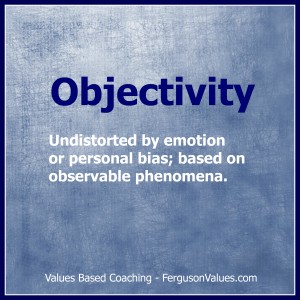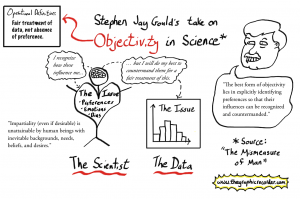Yesterday we finally removed the Saint Patrick’s Day books from the six display cabinets and replaced them with stuff on comedians and humor, which is our traditional display theme for April. We have about 280 humor books of all kinds, and it’s good to bring them to the attention of the population. It’s my considered opinion that inmates need to engage in healthful, constructive laughter as a coping mechanism against the vagaries of the prison environment.
Since our Department contracts with an outside vendor for the provision of entertainment DVDs, the Library by policy is forbidden to offer movie comedy. So, apart from our books-on-CD collection which contains a few dozen humor disks, the majority of our humor is in book form.
The humor books themselves are kept in a standalone single-faced wooden case, separate from the rest of the nonfiction. this is done partly to emphasize this genre of nonfiction, partly because my boss gave me the book case & told me to use it in good health, and partly because we needed to open up some space on the nonfiction wall.

The three centerpiece cases now display books about comedians which we find in both Humor and Biography — Sarah Silverman, Wanda Sykes, Don Rickles, Howie Mandell, Phyllis Diller, Charlie Chaplin, Chis Rock, Chelsea Handler, Bill Cosby, Whoopie Goldberg, George Lopez, the Smothers Brothers, Mae West, Barbara Eden, Roseanne Barr, Gilda Radner, Janeane Garofalo, Jack Benny, Burns & Allen, Audrey Meadows, Jerry Lewis, Woody Allen, Lucille Ball, and Mo’Nique, to name but a few. We own about four dozen comedian biographies, and this is because I’ve learned by talking with them that prisoners gravitate to the lives of comedians, many of whom have had a tough time in the business and a hard life to live. And they manage to give the gift of laughter, in spite of the odds. This is a hopeful message that tends to resonate with the inmate population.
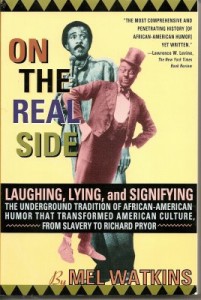
Two of the better books on American black comedians can be found in our Humor section. they are Mel Watkins’ On The Real Side and Black Comedians on Black Comics by Darryl Littleton. The Watkins text, although as excellent and comprehensive as the older Redd Foxx Encyclopedia of Black Humor, tends to be information-dense for many people, and doesn’t see as much use as it should. The Littleton text is more accessible, because it contains dozens of brief interviews with contemporary standup comics.
At present, the Library contains just a single text on the uses and meaning of humor, the superb Laughter and Liberation by the late, great American psychologist Harvey Mindess. I’ve read two dozen books on the the effects of laughter on human psychology, but I find the Mindess book to be the most accessible, and I talk it up in the Library every chance I get. Human uses of humor and laughter fascinate me, and no more so than within the confines and miseries of a penitentiary, where there is in fact tons of laughter each day to be heard–albeit much of it derisive and at the expense of others.
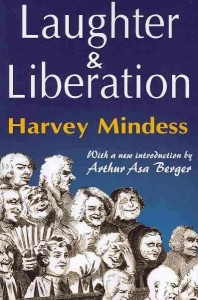 This book elucidates many of the ways in which humor frees us from societal constraints, constraints which–although arguably necessary for a civil and orderly society–tend to confine our spontaneity and playfulness. The book reminds us that poking fun at our constraints and sacred cows is actually a vital piece to our mental and physical health. It’s one of the most important books ever written on the subject.
This book elucidates many of the ways in which humor frees us from societal constraints, constraints which–although arguably necessary for a civil and orderly society–tend to confine our spontaneity and playfulness. The book reminds us that poking fun at our constraints and sacred cows is actually a vital piece to our mental and physical health. It’s one of the most important books ever written on the subject.
The remaining three display cases are filled with representative samplings of the Humor section: Bill Watterson, the Harvard Lampoon, Mad ?Magazine paperbacks, Shel Silverstein, Bill Maher, Jon Stewart, The Onion, Carlin, Woody Allen, even Charles Shulz & the ‘Peanuts’ gang. It is certainly true that, as in other Libraries, this material doesn’t fly out the door. It is just as true that when you offer to inmates a program built upon humor, that the interest in this material increases. 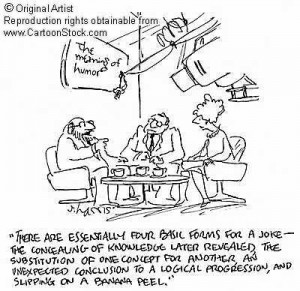 Suddenly, people notice with joy and enthusiasm that you have a Humor section, and material gets some use. Although there is much to be said for reader’s advisory services, in a correctional Library you must go a step further and bring program material to the attention of those who ordinarily might not give it a second look. My contention is that humor plays a vital role in keeping inmates grounded, balanced and, if not happy, then at least content with their present circumstances. Just as yoga instruction teaches us that it’s just as important to direct our breathing as it is to breathe, so it is with humor. It’s just as important to employ purposeful laughter as it is to enjoy a book of Sidney Harris cartoons.
Suddenly, people notice with joy and enthusiasm that you have a Humor section, and material gets some use. Although there is much to be said for reader’s advisory services, in a correctional Library you must go a step further and bring program material to the attention of those who ordinarily might not give it a second look. My contention is that humor plays a vital role in keeping inmates grounded, balanced and, if not happy, then at least content with their present circumstances. Just as yoga instruction teaches us that it’s just as important to direct our breathing as it is to breathe, so it is with humor. It’s just as important to employ purposeful laughter as it is to enjoy a book of Sidney Harris cartoons.

